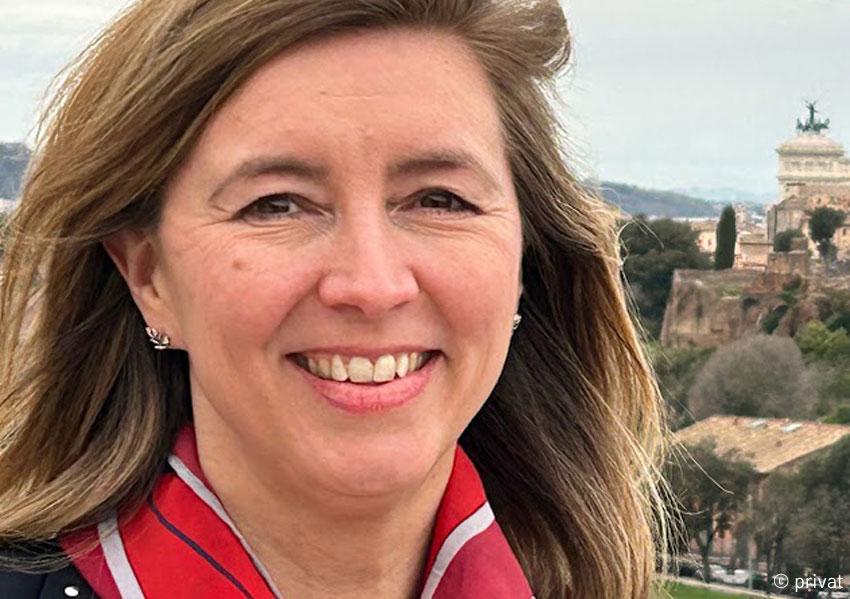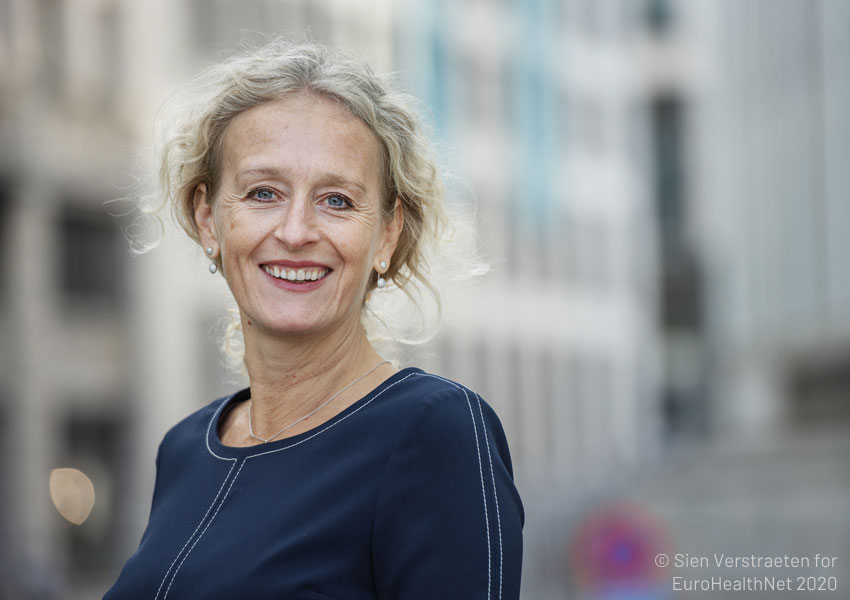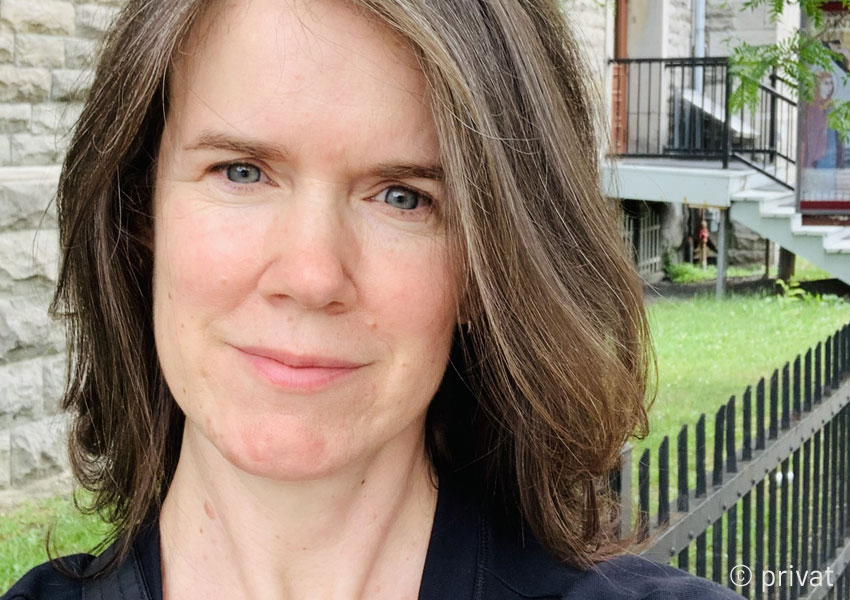Why do we need to rethink the existing roles of public health, and what role do prevention and health promotion measures play at a community level? Caroline Costongs, Director of EuroHealthNet and keynote speaker at BVPG-status conference 2022, about Health in All Policies, the wellbeing of people and planet, and an “Economy of Wellbeing”.
Population wellbeing and economic growth are intertwined and mutually reinforcing, as published by the Council of the European Union in 2019. This year, the European network of health promotion organisations, EuroHealthNet, published “An Economy of Wellbeing for health equity” (dossier in german: “Eine Ökonomie des Wohlergehens für die Gesundheitliche Gerechtigkeit“) presenting an alternative approach to our current economic system.
First, thank you for the interview and for picking up on our publication, which indeed is important to us. The way in which we live, work and play is becoming increasingly unsustainable. Childhood obesity, for example, is rising to concerning levels. As recently reported one in three children in the WHO European region are now overweight or obese. This is simply not acceptable.
Shockingly, recent statistics from Wageningen University in the Netherlands, found that only 3 percent of all foods marketed to children can be classified as healthy. They also highlighted that 79 percent of all supermarket food is unhealthy, mostly processed, or ultra-processed food, containing high levels of fat, salt, and/or sugar. Not only is this nutrient-poor food damaging to our health, but its production process is also having significant environmental impacts through increases in greenhouse gas emissions, land, and freshwater use and so on. Though this is only one example from one sector, there is much more evidence that illustrate our unsustainable and unhealthy ways of living.
For example, the inequalities gap in Europe is staggering. One in four children within the European Union is at risk of poverty or social exclusion. This is fuelled through complex and multiple practices and policy action ranging from inadequate public services, to gentrification, and higher pollution levels in deprived areas. Profit making is too often at the cost of people and planet, while this doesn’t need to be the case. There are emerging examples of how commercial and profitable activities can be decoupled from the use of fossil fuels. Other examples show how businesses can thrive on healthy and well-paid workers. The Economy of Wellbeing concept encourages the developments of such practices and provides a clear vision, which we at EuroHealthNet promote through our policy paper.
EuroHealthNet proposes the use of an alternative model to the current economic model through an “Economy of Wellbeing”. What is behind it and why might it be advisable for us to follow this approach?
The “Economy of Wellbeing” is actually an approach that was developed in Finland by one of our member organisations, SOSTE, and has since been taken further by the Finnish government. The government were brave and visionary in proposing this approach – which was presented during their Presidency of the Council of the European Union in 2019 – which ultimately led to Council Conclusions on the Economy of Wellbeing.
The model illustrates how the economy and wellbeing are two sides of the same coin. We simply cannot have one without the other. It builds on the widespread notion that the gross domestic product (GDP) cannot fully assess our economies alone and that new indicators and methodologies are needed to measure societal progress. It also presents arguments as to why wellbeing must be included in all governmental policies and decision making. In that sense it is complementary to earlier “Health in All Policies” concept (and presented by Finnish EU Council Conclusions in 2006).
Despite this, the concept has not come without its critics, with some arguing that the Economy of Wellbeing doesn’t sufficiently prioritise the wellbeing of the planet. However, as the health of people and planet are intrinsically linked, the model would equally work for both environmental and social sustainability as reflected by Kate Raworth’s doughnut model of social and planetary boundaries.
As health promoters we should aim for such a systemic change, one that benefits the health of everyone. We need to develop our capacities to advocate for such an approach at all levels, from local, regional to federal decision tables, contributing with sound evidence and solutions. Only then, by upstream engagement, our more downstream activities (which are also important) will pay off.
What would have to change in concrete terms to promote and maintain our health and the health of the planet in the long term while achieving sustainable and long-term economic growth?
The COVID-19 pandemic laid bare the various failures of our current economic and welfare systems. The severity of COVID-19 rose due to the already existing socio-economic and health inequalities that are present in our society in addition to the high levels of people who live with chronic diseases. Families living in low-quality housing and in deprived areas suffered more. Emerging data highlights an increase in calls relating to domestic violence with many women and children experiencing abuse and violence. Individuals with mental health problems or other health problems received delayed care, and so on.
Social services have been hollowing out since the financial crisis in 2008 and we are now facing the backlash as a result. Building back the resilience of people can only be done through a consistent prioritisation of investment in people’s wellbeing – starting from the early years (first 1000 days and early childhood education and care), throughout the life course until long term care. Several EU policies and strategies, such as the European Pillar of Social Rights and the new European Care Strategy are examples that are paving the way forward to a fairer future.
Prioritising actions that mitigate the climate crisis is also key. Phasing out fossil fuels, creating a responsible use of natural resources and protecting and promoting biodiversity, to name a few, is required if we are to safeguard the environment.
The European Green Deal, including the European Union’s (EU) Farm to Fork Strategy and Fit for 55 packages, demonstrate that actions are being taken at EU level to achieve climate neutrality. However, more needs to be done to take forward the Economy of Wellbeing, if we are to hit all the targets outlined within the United Nation’s 2030 Agenda and Sustainable Development Goals.
The pandemic alone has led to various rigorous actions that were taken in the course of the last two years. When there is a crisis and political will, important measures can be taken. . However, the question remains: How big does a crisis need to be (taking into consideration the current threat of climate crisis, food insecurity, social inequities, and under-valuation of essential workers), before real political action is taken?
Political action needed is one that reflects this paradigm change of the Economy of Wellbeing, rethinking economic growth as a concept that includes social and environmental goals on an equal footing.
For many, this sounds impossible or difficult to implement. How can an “Economy of Wellbeing for health equity” be translated into reality and what is the role of prevention and health promotion at the community level?
We should not become overwhelmed with the scope of the change needed, but rather focus on the added value we can bring – through the strengthening of our community health approaches.
However, we also need to be more ambitious. For example, we should make sure health promoting services get better funded. More and more public and private investors are keen to invest in programmes with green, social or health impacts. We need to stand ready with a pipeline of attractive solutions and clear and concrete proposals for action. In addition, Health promoters must not underestimate the potential power of legislation and make better use of our legislative systems.
There are many initiatives already in place that we can use as strong examples of societal impact. Evidence-based interventions from WHO through its Best Buys, have had previous successes with smoking bans, along with case studies on the taxation on unhealthy and unsustainable products, green and healthy procurement laws, and advertising bans.
We need to pro-actively engage with finance and legal actors to achieve the Economy of Wellbeing. We also need to make sure that our solutions address the real needs, and do not unintentionally worsen inequalities. We must co-create these solutions with targeted groups across the social gradient. This requires meaningful participation, giving communities a vested interest in their success, and opportunities for evaluation. By the way, there are already many local initiatives existing that benefit both health equity and the environment and organised by local communities. We should embrace, encourage and embed such initiatives in municipal public health and health promotion strategies and support them in the shift to an Economy of Wellbeing.
Where is this already being implemented?
A range of countries are already working with the Economy of Wellbeing concept, such as in New Zealand where, for example they have dedicated wellbeing budgets at national government.
In Europe, it is of course Finland who are leading by example, as they strive towards developing an Economy of Wellbeing roadmap to achieve a better balance between the societal dimensions for a more sustainable and fairer development. I am part of an international expert group Finland has set up on this concept.
The United Kingdom is also showing progress. In Scotland, for example, they have developed a Wellbeing Economy Monitor to measure how the country’s economy contributes to improving ideals that people value, such as health, equality, fair work, and environmental sustainability which the government uses to guide decision making. In Iceland they have a wellbeing framework with 39 indicators. Wales adopted a legal Act, namely, the “Well-being of Future Generations Act” that ensures the sustainability of future generations through environment, economy, society and culture – with a specific Commissioner and accountability processes in place.
There are ample experiences and good practices out there that we can learn from. All of these countries are part of the international Wellbeing Economy Governments network, and of other partnerships that have started to emerge in this area, such as WeAll, of which EuroHealthNet is also a member.
For Germany, which of course is a much bigger country, adopting an Economy of Wellbeing approach should also be feasible. The new Public Health Services Act (ÖGD) provides a great opportunity to rethink the roles of public health, health promotion and disease prevention in communities but also at national level. Important topics to consider are health inequalities, mental health, and climate change as part of a wider paradigm change such as the Economy of Wellbeing and how regional and local levels can best be supported.
To achieve health and well-being of the population, the concept of “Health in All Policies” (HiAP) – among others a focus topic of the BVPG – is considered promising. What are the intersections between these two concepts?
Addressing interlinked problems requires an intersectoral approach – encouraging system-thinking, setting common goals and joint financing. “Health in All Policies” is a key concept from the perspective of the health sector.
We should consider the health impacts in all other sector policies and understand how to best approach this together to advance health. However, I find this concept less capable to bring other sectors together. Other sectors have their own sectoral priorities and are not necessarily inspired by health as an overarching goal. EuroHealthNet has tried with a new concept “Health for All Policies” but even that doesn’t greatly facilitate cooperation.
The Economy of Wellbeing has a much bigger potential. Taking wellbeing as a horizontal ambition and vision to decide on trade-offs for the best outcomes for people and planet, the concept can be utilised to consider the interlinkages between sector challenges and include system-thinking as a mindset.
Finally, it is also a vision for the wellbeing of our planet which is so urgently needed and currently lacking in the HiAP approach. However, at EuroHealthNet, we embrace both concepts, depending on the context of our work, to achieve a more resilient, equitable and sustainable societies. It is worth mentioning that at the 10th WHO Global Health Promotion Conference, a charter on wellbeing was issued, which I encourage you to have a look at too as well as our short film on the Economy of Wellbeing of course!
The questions were posed by Linda Arzberger, Bundesvereinigung Prävention und Gesundheitsförderung e.V. (Federal Association for Prevention and Health Promotion).
Lesen Sie dazu auch:
Interview mit Prof.in Dr. Dagmar Starke, kommissarische Leiterin der Akademie für Öffentliches Gesundheitswesen in Düsseldorf (AÖGW) und BVPG-Vorstandsmitglied: „In einem modernen ÖGD wird Gesundheitsförderung zum Coachingprozess“.
Weitere Informationen zur BVPG-Statuskonferenz „Die Bedeutung des ÖGD für die kommunale Prävention und Gesundheitsförderung“ erhalten Sie hier.
Interview mit Prof. Dr. Ilona Kickbusch: Prävention und Gesundheitsförderung – Schwerpunkt Health in All Policies.
Mehr zu Prävention und Gesundheitsförderung in den Lebenswelten erfahren Sie hier.
Möchten Sie über Neues und Wissenswertes zu Prävention und Gesundheitsförderung auf dem Laufenden gehalten werden? Hier können Sie unseren monatlich erscheinenden Newsletter bestellen.
Caroline Costongs | Director of EuroHealthNet; she oversees EuroHealthNet’s Framework Agreement with the European Commission (2022-2026) and leads on EuroHealthNet’s MoU with WHO Europe (2021-2026). Priority areas include: health promotion across the life-course, NCDs prevention, food policy, climate change and health, mental health, digital health literacy and the Economy of Wellbeing; active in various EU and WHO fora, as well as in Advisory Boards of European projects and is a member of the ICC – International Council for the European Public Health Conference; international background with more than 25 years of experience in public health and health promotion; M.Sc. in Public Health from the University of Maastricht.
Brussels-based, EuroHealthNet is a non-profit partnership of organisations, agencies and statutory bodies working to contribute to a healthier Europe by promoting health and health equity between and within European countries. EuroHealthNet achieves this through its partnership framework by supporting members’ work in EU and associated states through policy and project development, networking, and communications. It has connections with national and regional governments, as well as with the European institutions, and therefore a good understanding of how evidence and information on health equity can be introduced in current policy making agendas. The current President of EuroHealthNet is Prof. Dr. Martin Dietrich, acting director of BZgA, the Bundeszentrale für gesundheitliche Aufklärung in Germany.



